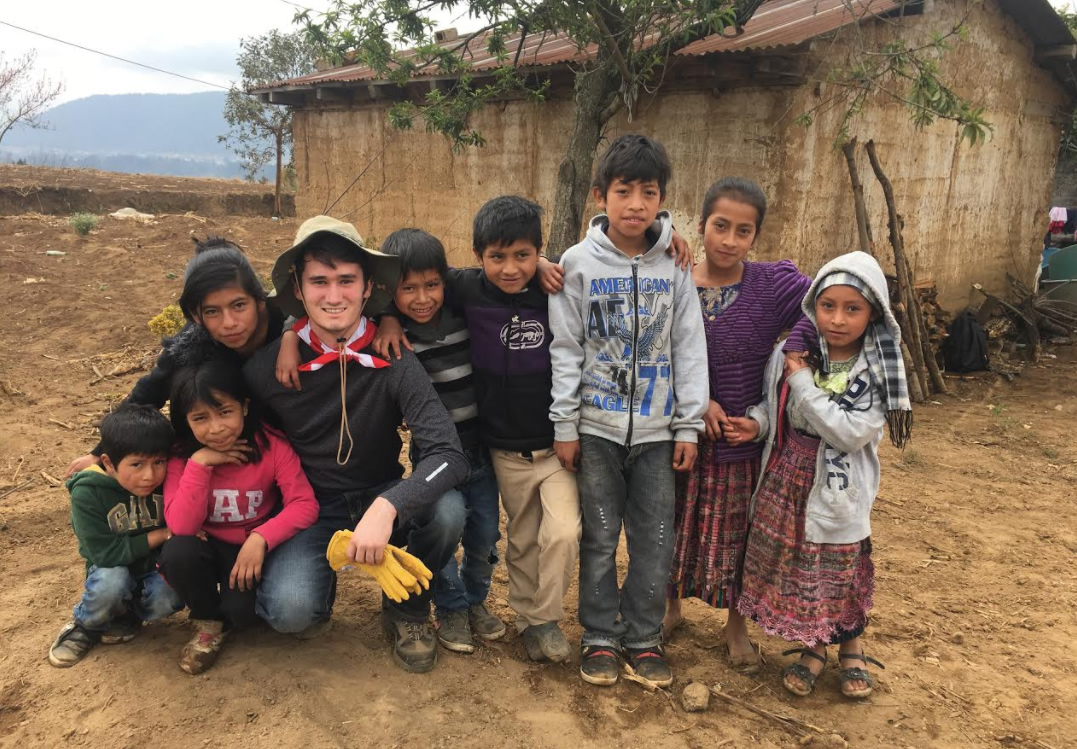A Case for Empathy
Trenton Davis with his Guatemalan family on a Habitat for Humanity trip in 2016
By: Trenton Davis
This article is part of a series the Economics of Compassion Initiative/Jubilee Circle is sharing in Cincinnati’s Streetvibes newspaper and explores the need for empathy in a compassionate, local economy.
My family is originally from Bedford, Michigan. My parents are high school sweethearts and grew up a few miles from each other, so all our extended family lives in the same small town. The people of Bedford drive pickup trucks. They hunt. My uncle Rich has a stuffed 5-point buck in his living room that he personally shot. They drive a little differently up there: there’s less people speeding. Less police on the roads. The town is designed in squares with exactly a mile in between each road. People tell me it’s impossible to get lost in Bedford—but I still manage to.
The quickest route to Bedford involves driving directly through Toledo, getting off just outside the city, and then taking backroads to arrive at my grandparents’ on Dean Road. The roads outside Toledo lead past plant after plant. There is a steel factory. There’s a GM factory. Before the crash of 2008, we passed malls and typical little box houses. I remember one specific little strip mall on the way into Bedford across from a BP; it never really stuck out to me until after the crash, however.
Now, the drive to Bedford makes my parents disheartened. Many of the houses are boarded up. The streets are poorly kempt—Michigan roads are typically cracked from all their cold weather—but now the infrastructure is frail and waning. The malls and shops are gone. That strip mall across from BP, it’s now a Platinum Show Girls. The BP across the street no longer offers gas—just liquor. I’ve never passed more gentlemen’s clubs than on the way into Bedford. Over the years we’ve driven to Michigan hundreds of times for holidays, birthdays, and to see family—unintentionally we became witness to the changes that have occurred in America these past ten years.
My uncle used to work for Ford—it’s where his father worked. We got a discount on our first American-made van from his plant. However, during the crisis the plant shut down and now he works at Chrysler. He was one of the lucky ones. He was able to adapt when machines came to the car industry and now works on the machines on the line.
My aunt is a realtor. During the crisis, as well as recently, she has nearly lost her home. Her livelihood depends on the market. During the crisis, housing prices in neighborhoods like the one I live in went up. In Bedford and many other neighborhoods in the US, they plummeted.
Many of my relatives to the north struggle with alcoholism. It’s an unspoken issue in our family. We keep it from the children, and we make sure to watch them during the holidays. It’s a difficult reality. When the plants close up and the jobs move away, the stores and shops follow. The laundromat at the corner and the ice cream shop on Dean are boarded up until a liquor store moves in and sets up shop to fill the real estate void. The community as we knew it disappears with divestment. We saw it first with urban plight, and now we’re seeing it in forgotten rural communities.
Per numerous studies on the Great Recession, while the lower half of the income ladder’s wealth was drastically falling, the wealthy were getting wealthier. I was ten at the time, and my family was purchasing a new, bigger house in a subdivision of our town populated by houses with pools and hot tubs out back. My parents both possess doctorates, so their jobs never seemed to be in question. My family’s education gave us privilege, and we didn’t have to deal with the divestment in our community that was occurring back home in Michigan. For us, the recession never really hit. Privilege made me oblivious to what was in front of my eyes. During the last election, because of my liberal nature, I marginalized the voice of Trump supporters. It caused rifts in my family. We would speak in hushed tones about which aunts and uncles were supporting that movement. My aunt threatened to divorce her husband if he voted for Trump. That movement was bigotry. That movement was foolish. There was job growth. We were coming out of the recession. America was fine. I possessed animosity towards my family from the north. This animosity reveals something vital.
Empiricism is a beautiful version of reality. We can experiment and measure things objectively. It’s a way of thinking that has sprouted so much knowledge. We only examine our own lived experiences, and when presented with facts, we select only the facts that back our version of reality. This creates a divide. Instead of asking my uncle why he was drinking so much, I assumed it was because he was working a lot. Our current way of thinking lacks empathy for those that are experiencing something different than the general “trend”. Empiricism doesn’t have feelings, it is by nature, objective. We need more empathy in our society. We need to care about our neighbors and our families. This way of thinking helps the wealthy and privileged distance themselves from those that are feeling the effects of disasters. We often think of charity as giving money to an organization that does good, and thus, we have created an industry of do-gooders. We call these non-profit organizations. Corporations, when wages rise, can simply divest and take their money to find other sources of labor—whether that be through technology or through a global labor market. We can’t fault the wealthy or the corporations. They are doing what they believe is best. Through empiricism, they can easily justify that they are doing what is right for society. After all, both the wealthy and the corporations offer us jobs that feed our families. However, this gap that our way of thinking leaves behind is ravaging our communities and dividing our society.
The Jubilee Campaign believes we need to build an empathetic empiricism. We need to teach methodologies that will help us understand the human costs of innovation and globalism. Our business and urban planning schools should focus on instilling community and equity building. We need resilience. Rise with Jubilee in creating a new economy and a new way of thinking. We need a compassionate, local economy that cares about the people living there. Join the conversation and bring it to people that it matters, so that we can get investments in our community. If we build strong communities, we will be able to withstand anything together.
Related Articles:
The Consumer Economy and its Crushing Assumptions




